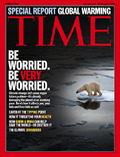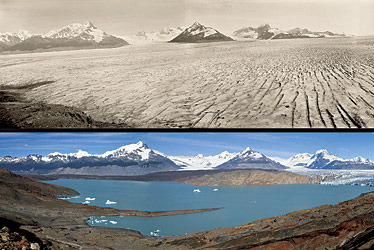Global Warming--It's Time to Start Paying Attention
he created them godlike,
Reflecting God’s nature.
He created them male and female.
God blessed them:
“Prosper! Reproduce! Fill Earth! Take charge!
Be responsible for fish in the sea and birds in the air,
for every living thing that moves on the face of Earth.”
Then God said, “I’ve given you
every sort of seed-bearing plant on Earth
And every kind of fruit-bearing tree,
given them to you for food.
To all animals and all birds,
everything that moves and breathes,
I give whatever grows out of the ground for food.”
And there it was.
God looked over everything he had made;
it was so good, so very good!
It was evening, it was morning—
Day Six.”
(Gen 1:27-31, The Message, emphasis added)
“The Lord God took the man and placed him in the garden of Eden to work it and watch over it.”
(Gen 2:15, HCSB)

If you haven't read the newest issue of Time Magazine yet, I encourage you to go pick up a copy or read it at the library. Although, I can provide you with a link to the main article here, you really need to review the photographs and charts yourself that are only found in the print version.
I confess to you that I've always been a bit skeptical about global warming concerns. How do we know that warming trends are not just part of normal earth cycles? How do we know for certain that humans are the cause? Is there anything we could really do about such things anyway? And I admit that in my skepticism I've used these kinds of questions as an excuse to ignore the problem. But the problem is upon us. The problem is real and its here.

"So what?" you ask. Well, this isn't just confined to one glacier. It's happening all over the world. Not only are glaciers melting, but so are polar caps and permafrost. This huge amount of ice is part of God's system for maintaining life on this planet. The ice does two things. Not only does it help keep ocean temperatures at an optimal level, but it also reflects unneeded sunlight back into space. Take away the ice, and not only do you start to lose many of your coastlines, but things start to warm up all over the planet. The latter is more significant than just causing you to run your air conditioner a little harder. The warmer oceans spawn tsunamis and hurricanes with a much greater intensity than what we've been used to over the last few thousand years.
What causes glaciers and ice caps to melt? Well, there are lots of factors, but undeniably, carbon dioxide (CO2)plays a real part in this. We need CO2 to maintain the temperature levels we are used to, but too much of it has dangerous side effects. CO2 in our atmosphere allows sunlight to come in while preventing the heat from going back out. But you could see why too much would be a bad thing. What causes too much CO2 in our atmosphere? Well, lots of things. Some causes are natural such as volcanic eruptions (above and below the sea), forrest fires, and natural biological decay of plant and animal matter. But burning fossil fuels (the stuff that makes your car move) also releases CO2 into the atmosphere. Not only gasoline, but also coal for electricity causes these emissions, called greenhouse gasses. And it's a cycle that feeds off itself exponentially. For instance, as the permafrost (ground frozen since the ice age) starts to melt in places like Alaska, Canada, and Siberia because of the factors described above, biological matter that has been frozen since before the ice age has begun to decay, adding even more CO2 to our atmosphere.
I firmly believe in the "anthropic principle, which states that from its very inception the universe was fine-tuned for the emergence of human life." Consider this explanation from Norman Geisler's Systematic Theology, vol. 1:
...oxygen comprises 21 percent of the atmosphere. If it were 25 percent, fires would erupt, and if only 15 percent, humans would suffocate. If the gravitational force were altered by merely one part in ten to the fortieth power (ten followed by 40 zeros), the sun would not exist and the moon would crash into the earth or veer off into space ... If the centrifugal force of planetary movement did not precisely balance the gravitational forces, nothing could be held in orbit around the sun. If the universe were expanding at a rate one-millionth more slowly than it is, the temperature of the earth would be 10,000 degrees celsius. If Jupiter were not in its current order, the earth would be bombarded with space material. If the earth's crust were thicker, too much oxygen would be transmitted to it to support life. If it were thinner, volcanic and tectonic activity would make life untenable. And if the rotation of the earth took longer than twenty-four hours, temperature differences between night and day would be too great... (33-34).
The anthropic principle extends to the very makeup of our atmosphere in relation to our ability to function and survive in the planetary home God has given us. Sadly, humankind has a poor track record of showing gratitude for God's provision. This goes all the way back to Genesis 3, does it not?
The article series in Time did not give definitive hope that global warming can be averted. It may in fact be too late. The ball may be rolling, and rolling exponentially. But that doesn't mean that we can't try--that we can't begin to change our ways now. If the Lord tarries, and we do nothing, this will not mean devastation in our generation, but life would certainly be of a different quality within three or four generations.
What can we do?
First, we have to stop sticking our heads in the sand over this issue. We can no longer dismiss it as the rantings of the political left or environmental extremists. A newly formed group, the Evangelical Climate Initiative, is looking for ways to address the problem. Their website is worth exploring. View their statement here. Also note the significant number of supporters from both academic and ecclesiastical circles of the Evangelical world, including men like David Dockery, Timothy George, David Gushee and Rick Warren.
Second, we have to start taking earth stewardship seriously. The Bible speaks quite a bit about these issues. In the long-run, it could even be the number-one pro-life concern.
Third, while we must take responsibility for the task God has given us to take care of his earth, we cannot forget that ultimately God is in control of our future. That's not an excuse to ignore global warming or any other issue, but it is a reminder that we have a hope and a future.
“The earth is the Lord’s, and all it contains,
The world, and those who dwell in it.”
(Psa 24:1 NASB)
Download-- Evangelical Climate Initiative booklet:
eci-booklet









